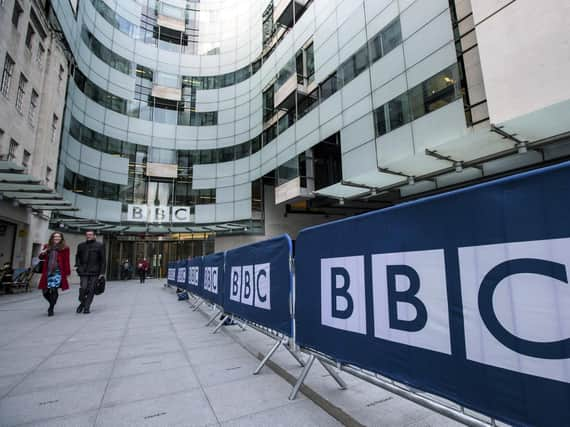Letters - Saturday October 3, 2020


Re: the ceasing of provision of free TV licences for those over 75.
Whilst understanding people’s worries and anger over this, I feel that perhaps the pressures facing the BBC have been underestimated.
Advertisement
Hide AdAdvertisement
Hide AdFree TV licences for over 75s were introduced in 2000 by the then Chancellor, Gordon Brown, as part of a package of benefits for older people like free travel and the winter fuel allowances, and was widely seen as a positive social welfare measure.
In 2015, the then Chancellor George Osborne, as part of the negotiations around renewal of the BBC Charter, gained agreement from the BBC that they would fund licences for over 75s. In effect making the BBC fund a social welfare measure out of its income rather than the Treasury.
In the last decade, the BBC has also taken over funding for such things as covering the costs of digital switchover from analogue TV; rural broadband rollout; local TV; funding of Welsh-language channel S4C; funding of the World Service and Monitoring Service; paying for journalists employed by local newspapers to cover local democracy and funding commercial broadcasters to make children’s TV and radio.
In the last charter period, it has made savings of £1.6bn (£244m a year) and is committed to making savings of a further £40m by 2022.
Advertisement
Hide AdAdvertisement
Hide AdIt represents good value for money providing news, entertainment, factual, radio, internet, education and children’s television.
The list goes on. No one person could or would want to consume it all but it is there for the very nominal sum of £157.50 or about 42p a day.
Despite all this, the BBC continues to face a climate of unprecedented hostility from government and accusations of bias, profligacy and worse.
I truly believe the BBC is a great public service broadcaster. It’s not perfect and of course it should be held to account through the various checks and balances such as charter renewal and the overview of Ofcom.
Advertisement
Hide AdAdvertisement
Hide AdBut it does mean that if we want to keep it, we should value it, even if we don’t agree with everything it says or enjoy all its output.
Tricia Harris
via email
Appeal
Better support needed for MS
More than 130,000 people live with MS in the UK, and many rely on services like physiotherapy, speech and language therapy and exercise classes to stay active, manage their condition and do the everyday things many others take for granted.
But the MS Society’s new report, Too Much To Lose, shows that since lockdown began, seven in 10 people (69 per cent) with MS couldn’t speak to a rehabilitation professional when they needed to.
Without this support, people with MS are losing their mobility, their confidence and their independence.
Advertisement
Hide AdAdvertisement
Hide AdI try to keep going as much as possible but we desperately need classes that specialise in movement just for MS and similar disabilities.
Readers can help by asking local health leaders to pledge their support for better access to rehabilitation for people with neurological conditions like MS. For more information, visit https://www.mssociety.org.uk/local-health.
Donna Moylan
via email
Politics
Trump and the coronavirus
Re: Trump testing positive for coronavirus. This is the first time that I have seen “Trump” and “Positive” in the same sentence.
Hopefully, after he and Melania do their time in isolation, they will come out healthy with a greater understanding of this pandemic and the value of masks and social distancing. Mask up and keep your distance, please.
Dennis Fitzgerald
via email
Society
Digital obsession discriminates
Advertisement
Hide AdAdvertisement
Hide AdRe: Apps. The powers-that-be make arrogant and ignorant assumptions that everyone will use one, or even want one.
There’s also the assumption that everyone has a car. Yet nearly one fifth of the population lacks access to a car or van.
Many organisations now require prior booking for their attractions.
Whilst I understand a need to restrict numbers, they insist on online booking.
Advertisement
Hide AdAdvertisement
Hide AdRecently, having unexpected free time, I went to an English Heritage property.
The place was obviously empty but staff said I couldn’t visit as I’d not booked online.
So they lost a customer. I couldn’t book as I don’t have a smartphone nor, at their prices, do I wish to have one.
It seems English Heritage doesn’t like staff to use discretion, but they are not the only culprits.
Advertisement
Hide AdAdvertisement
Hide AdPublic bodies are reasonably required to make provision for people with disabilities and avoid discrimination.
So why should they discriminate against the substantial part of the population who cannot afford or do not wish to use the latest expensive technology?
Arrogant – and also bad business.
Roger Backhouse
Address supplied
Comment Guidelines
National World encourages reader discussion on our stories. User feedback, insights and back-and-forth exchanges add a rich layer of context to reporting. Please review our Community Guidelines before commenting.